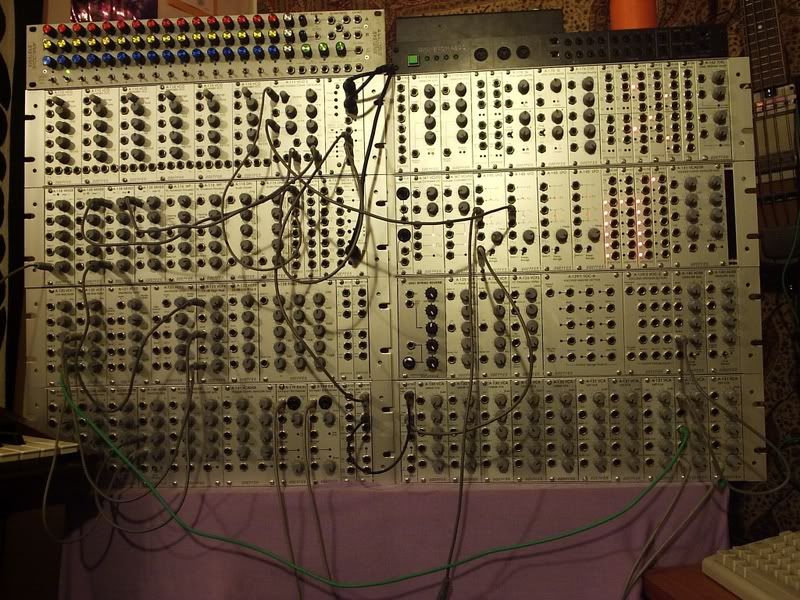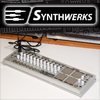| Author |
Message |
dasz

Joined: Oct 16, 2004
Posts: 1644
Location: victoria, canada
Audio files: 29
G2 patch files: 56
|
 Posted: Tue Sep 22, 2009 11:23 am Post subject: Posted: Tue Sep 22, 2009 11:23 am Post subject:
|
  |
|
whoops, looks like I got off topic.
to put it back on topic, I have used one of my G2's a lot less than the other. so I will continue to do so, to save the other one more (I have been using my newer one for the last 6 months and other than that maybe 4 months of use here and there).
So if it is a matter of time question (for example how many times can you save a patch in memory before memory goes), then I know one synth has done a hell of a lot more saves than the other.
I am curious how many people in addition to gomidas have had their boards go on them? Can we do a poll?
/Dasz |
|
|
Back to top
|
|
 |
iPassenger

Joined: Jan 27, 2007
Posts: 1068
Location: Sheffield, UK
Audio files: 5
G2 patch files: 78
|
|
|
Back to top
|
|
 |
dasz

Joined: Oct 16, 2004
Posts: 1644
Location: victoria, canada
Audio files: 29
G2 patch files: 56
|
 Posted: Tue Sep 22, 2009 12:24 pm Post subject: Posted: Tue Sep 22, 2009 12:24 pm Post subject:
|
  |
|
| dorremifasol wrote: | | dasz wrote: | For me, I want a warm analog moog sounding filter, something really rich and warm which self-oscillates and still has a deep frequency range while doing so. it could be mono synth. with midi.
I'm not too keen on Dave smith gear, I have tried them, nor the sherman, but I like the moog little phatty, but I wish it had more knobs. I'm going to listen to an arp oddassy next month and I do like what I have heard on youtube, but it would need a midi/cv thing.
I'm not willing to spend more than $600USD. I am open to suggestions. |
Dasz, may I suggest you a Doepfer Dark Energy?
http://www.doepfer.de/home_e.htm
http://www.youtube.com/watch?v=QLs6XQxO6uE
Looks very good  |
 inspired .. and I think I know what I'm looking for (it's these midi based semi modular desktop units!) ... I feel excited and my heart is racing ... that is a good sign ... all the other synths I looked into did not have this effect (even the telemark as it was soooo large) ... inspired .. and I think I know what I'm looking for (it's these midi based semi modular desktop units!) ... I feel excited and my heart is racing ... that is a good sign ... all the other synths I looked into did not have this effect (even the telemark as it was soooo large) ...
what would your thoughts be on build quality of either b0x (the doepfer and the mfb)?
Getting money ready...
/Dasz |
|
|
Back to top
|
|
 |
dorremifasol

Joined: Sep 28, 2006
Posts: 823
Location: Barcelona, Spain
Audio files: 7
G2 patch files: 49
|
 Posted: Tue Sep 22, 2009 2:15 pm Post subject: Posted: Tue Sep 22, 2009 2:15 pm Post subject:
|
  |
|
I don't own either of these, but to my eyes the Doepfer is better built (and nicer too!). MFB stuff seems great but built with compromises to lower the price. From MFB I'm in love with the MFB 522, absolutely great sounding analog drum machine! I must get one of those someday...
My brain is boiling lately with the idea of starting to build a real analog modular synthesizer to go with my G2... I only need a bit of space... oh and money 
_________________
Cheers,
Albert |
|
|
Back to top
|
|
 |
Inventor
Stream Operator

Joined: Oct 13, 2007
Posts: 6221
Location: near Austin, Tx, USA
Audio files: 267
|
 Posted: Tue Sep 22, 2009 3:15 pm Post subject: Posted: Tue Sep 22, 2009 3:15 pm Post subject:
|
  |
|
I'm sort of ever so slowly building a software modular as you call it, but it's kind of different. It will have ChucK running on a netbook with two channels of audio out and two of audio in to an eChuck modular synthesizer that I'm designing (with lots of help). The boards under development for the synth are Karplus-Strong, Boolean Sequencing, and Song Sequencer.
Les
_________________
"Let's make noise for peace." - Kijjaz |
|
|
Back to top
|
|
 |
iPassenger

Joined: Jan 27, 2007
Posts: 1068
Location: Sheffield, UK
Audio files: 5
G2 patch files: 78
|
 Posted: Wed Sep 23, 2009 2:14 am Post subject: Posted: Wed Sep 23, 2009 2:14 am Post subject:
|
  |
|
| dorremifasol wrote: | I don't own either of these, but to my eyes the Doepfer is better built (and nicer too!). MFB stuff seems great but built with compromises to lower the price. From MFB I'm in love with the MFB 522, absolutely great sounding analog drum machine! I must get one of those someday...
My brain is boiling lately with the idea of starting to build a real analog modular synthesizer to go with my G2... I only need a bit of space... oh and money  |
Yeah, I agree the Doepfer looks more robust but then the MFB looks a fair bit more modular.... hmmm... tough one.
Me too on the modular, I keep dreaming of putting together a nice filter, and env follower and maybe an lfo or a ring mod in one of those tiny doepfer cases, just for audio mangling.. Still ends up costing a good £3-400 though... I think I have priced it up and virtually put it together about 3 times! 
_________________
iP (Ross)
- http://ipassenger.bandcamp.com
- http://soundcloud.com/ipassenger |
|
|
Back to top
|
|
 |
purusha
Joined: Mar 13, 2008
Posts: 131
Location: Ilkley
|
 Posted: Wed Sep 23, 2009 6:46 am Post subject: Posted: Wed Sep 23, 2009 6:46 am Post subject:
|
  |
|
Here's someone who obviously isn't "mucking about" with his Doepfer kit. This belongs to engineer / producer - Ott (he's just posted this on another forum).


_________________
OVNI Soundcloud Purusha Soundcloud |
|
|
Back to top
|
|
 |
buzzr
Joined: Dec 13, 2007
Posts: 360
Location: portland
Audio files: 1
G2 patch files: 1
|
 Posted: Wed Sep 23, 2009 6:48 am Post subject: Posted: Wed Sep 23, 2009 6:48 am Post subject:
|
  |
|
| yep,, analog is nice, but it takes up an entire room! |
|
|
Back to top
|
|
 |
dasz

Joined: Oct 16, 2004
Posts: 1644
Location: victoria, canada
Audio files: 29
G2 patch files: 56
|
 Posted: Wed Sep 23, 2009 10:06 am Post subject: Posted: Wed Sep 23, 2009 10:06 am Post subject:
|
  |
|
I'm quite infatuated with the Dark Energy. 
The sound, routing, size, build quality, and MIDI implementation seem right.
The SEM also looks great. hmmmm
/Dasz |
|
|
Back to top
|
|
 |
bar|none
Joined: Jul 06, 2009
Posts: 20
Location: WA
|
 Posted: Wed Sep 23, 2009 11:18 am Post subject: Posted: Wed Sep 23, 2009 11:18 am Post subject:
|
  |
|
I have a 12U Eurorack modular and also a Pacarana Kyma system.
I however will say that one of the best software/hardware based machines for modular fatness is the Spectralis. Also a ridiculous bargain used.
There have been huge advancements from the pre 1.0 OS .97 and now we are at 1.04 OS. This machine really does not get the respect it deserves. Worth checking out. Sometimes I'll actually take a patch I made on the modular and build it again on the Specki to be able to call up later. The real analog filters and fixed filterbank + the sequencer is another reason to get this machine. |
|
|
Back to top
|
|
 |
grimley

Joined: Jul 07, 2004
Posts: 168
Location: Seattle
G2 patch files: 9
|
|
|
Back to top
|
|
 |
3phase

Joined: Jul 27, 2004
Posts: 1189
Location: Berlin
Audio files: 13
G2 patch files: 141
|
 Posted: Thu Sep 24, 2009 7:00 am Post subject:
Re: The death of sofware modulars Posted: Thu Sep 24, 2009 7:00 am Post subject:
Re: The death of sofware modulars |
  |
|
| buzzr wrote: | | Reaktor has been stuck in limbo, . |
I wouldnt say that... it became silent around reaktor but it actually vastly improoved its stability and usability..during the last updates.
user created core macros pop up here and there that offer more analog sounding modules and similar to the nord the real potential of reaktor is still to be explored.. no real need for new functions.
I just started to use it more again.. |
|
|
Back to top
|
|
 |
ersatzplanet

Joined: Jul 24, 2005
Posts: 65
Location: Seattle, WA, USA
|
 Posted: Tue Sep 29, 2009 5:54 pm Post subject: Posted: Tue Sep 29, 2009 5:54 pm Post subject:
|
  |
|
I just can't see why Clavia just doesn't spend some engineering time and convert the G2 Demo program into a full featured product and charge for it. I would buy it if it took advantage of my audio interface and did more than just 2 channels, took audio into itself from other programs or wave files, and used more of the full set of G2's modules. I have used the Demo to do Volta like control of my modular and it works great (but only 2 channels!). I would think that since the demo is a working product now that fleshing it out would not be a huge task, Why not turn all the engineering time spent on the Demo into a software only product with a decent profit margin? I guess Clavia is one of those companies that just moves on afrom older product/ideas and they just become dead forever.
_________________
James Husted, Designer
Synthwerks, LLC
www.synthwerks.com |
|
|
Back to top
|
|
 |
dorremifasol

Joined: Sep 28, 2006
Posts: 823
Location: Barcelona, Spain
Audio files: 7
G2 patch files: 49
|
 Posted: Tue Sep 29, 2009 11:00 pm Post subject: Posted: Tue Sep 29, 2009 11:00 pm Post subject:
|
  |
|
I can think of at least 2 reasons:
- They still may put a new virtual modular generation on the market, so they are reserving the concept, usability, etc, for the future machine.
- The demo runs a emulation of the Motorola DSP, and that uses a lot of CPU power. Converting all the DSP code to native x86 code would be like doing it all from scratch.
_________________
Cheers,
Albert |
|
|
Back to top
|
|
 |
Andreasfr
Joined: Apr 29, 2009
Posts: 3
Location: Copenhagen, Denmark
|
 Posted: Sun Oct 11, 2009 7:48 am Post subject: Posted: Sun Oct 11, 2009 7:48 am Post subject:
|
  |
|
I was just thinking the exact same thing! I would pay for the G2 in standalone mode like ersatzplanet point out, even though I already have a G2 keyboard. I just soooo hope that Clavia's reason for holding back is the first one on dorremifasol's list and not the second.. That would be a real shame..
But also slightly OT; I've also been torn between the Dark Energy and the Kraftzwerg.
I've been trying to patch an intuitive noise box for live use together in the G2, but the 7 bit scale of midi data makes tweaking feel... well.. scaled and steppy. For instance, when coarse tuning an oscillator it always happens in semi tone-steps (beside the partial mode). I want it to be more smooth to feel more analog. Do you people know how to do this or is that why we are having GAS when looking at real analog modulars?  |
|
|
Back to top
|
|
 |
purusha
Joined: Mar 13, 2008
Posts: 131
Location: Ilkley
|
 Posted: Mon Oct 12, 2009 5:50 am Post subject: Posted: Mon Oct 12, 2009 5:50 am Post subject:
|
  |
|
| dorremifasol wrote: | | The demo runs a emulation of the Motorola DSP, and that uses a lot of CPU power. Converting all the DSP code to native x86 code would be like doing it all from scratch. |
Depends what language it's written in.
If it's all or mostly in 'C' or C++, it ought to be reasonably easy to port.
_________________
OVNI Soundcloud Purusha Soundcloud |
|
|
Back to top
|
|
 |
BobTheDog

Joined: Feb 28, 2005
Posts: 4044
Location: England
Audio files: 32
G2 patch files: 15
|
 Posted: Mon Oct 12, 2009 5:55 am Post subject: Posted: Mon Oct 12, 2009 5:55 am Post subject:
|
  |
|
The DSP code will be motorola 56K not a high level language.
High level languages are not very good at generating code for DSPs which tend to have instruction sets and memory layouts quite different to a "normal" processor. |
|
|
Back to top
|
|
 |
purusha
Joined: Mar 13, 2008
Posts: 131
Location: Ilkley
|
 Posted: Mon Oct 12, 2009 6:56 am Post subject: Posted: Mon Oct 12, 2009 6:56 am Post subject:
|
  |
|
Not necessarily true I'm afraid, and I speak as someone who spent 5 years working on Texas Instruments DSPs (which are built on the Harvard architectural model).

I even wrote a custom real-time pre-emptive OS for TMS320 - in 'C' with a few hand-optimised assembler routines.
Most of the code for DSP systems these days is typically written in 'C', with assembler usually only used where the code needs hand-optimisation.
Many off-the-shelf DSP algorithm libraries are written in 'C'. Optimisation routines for 'C' are so good these days that it's often not worth delving into assembler (depending on scenario).
I'd hazard a guess that G2 is probably a hybrid - high level stuff written in 'C' with optimised assembler routines.
Like I implied in the previous post, it would entirely depend on the mix used in the G2 code-base.
Edit: a quick Google has turned this up:
http://www.allbusiness.com/technology/computer-software/267479-1.html
It looks like Motorola are using a Gnu 'C' cross-compiler for at least some of their systems.
_________________
OVNI Soundcloud Purusha Soundcloud |
|
|
Back to top
|
|
 |
BobTheDog

Joined: Feb 28, 2005
Posts: 4044
Location: England
Audio files: 32
G2 patch files: 15
|
 Posted: Mon Oct 12, 2009 7:13 am Post subject: Posted: Mon Oct 12, 2009 7:13 am Post subject:
|
  |
|
Mmm, I am not an expert but I haven't seen a c-compiler generate decent 56K, but I am willing to be proven wrong.
Also And I state yet again I am not an expert from what I have seen about DSP architecture a C compiler would not generate performance critical code, for instance on a 56K how would the compiler "know" how to map my C based FFT algorithm to use the special addressing modes available on the dsp?
I understand that C could well be used for non-performant parts of the system but for the G2 I cannot imagine there is much of that.
Cheers
Andy |
|
|
Back to top
|
|
 |
BobTheDog

Joined: Feb 28, 2005
Posts: 4044
Location: England
Audio files: 32
G2 patch files: 15
|
 Posted: Mon Oct 12, 2009 7:14 am Post subject: Posted: Mon Oct 12, 2009 7:14 am Post subject:
|
  |
|
| P.s. the gcc cross compiler for 56k is absolutely useless. |
|
|
Back to top
|
|
 |
purusha
Joined: Mar 13, 2008
Posts: 131
Location: Ilkley
|
 Posted: Mon Oct 12, 2009 7:28 am Post subject: Posted: Mon Oct 12, 2009 7:28 am Post subject:
|
  |
|
| BobTheDog wrote: | | Also And I state yet again I am not an expert from what I have seen about DSP architecture a C compiler would not generate performance critical code |
Which is why, as I say above, you can hand-optimise any sections you like.
| BobTheDog wrote: | | for instance on a 56K how would the compiler "know" how to map my C based FFT algorithm to use the special addressing modes available on the dsp? |
From what I'm reading, the 56K is Harvard, like the TMS320 series I used to work on. All that means in terms of addressing is: the instruction and data busses are separate. There's no major compiler trickery involved in dealing with that - or at least none I've come across.
The FFT algorithms themselves are purely based on arithmetic, not addressing mechanisms. If they're dealing with a buffered data, then that just gets pulled from the data buss. No problem.
| BobTheDog wrote: | | I understand that C could well be used for non-performant parts of the system but for the G2 I cannot imagine there is much of that. |
I'd guess the opposite. I haven't seen the G2 code, but it'd make much more sense to me having the module control side of things written in 'C' than assembler. Not impossible to do it all in assembler by any means, but you'd have to be a bit of a masochist I reckon.
I haven't specifically used the 58K GNU cross-compiler (although I've heavily used the GNU compiler for cross-compiling MIPS code), but the Texas propriety one wasn't exactly brilliant either. That didn't stop me and my team from using it. We just learned to live with its foibles. Each routine it churned out was analysed to see if it was worth optimising. 9 times out of 10, what it produced was plenty good enough.
...but like I say (again), it entirely depends on how G2 is put together and the potential balance of 'C' and assembler. Your guess is as good as mine as to exactly how Nord have approached this.
All I'm saying is: if they've used lots of 'C', the job would be easier than if the same code were assembler. So - it's not necessarily as hard to port as we might assume.
Make sense?

_________________
OVNI Soundcloud Purusha Soundcloud |
|
|
Back to top
|
|
 |
Antimon
Joined: Jan 18, 2005
Posts: 4145
Location: Sweden
Audio files: 371
G2 patch files: 100
|
 Posted: Mon Oct 12, 2009 7:43 am Post subject: Posted: Mon Oct 12, 2009 7:43 am Post subject:
|
  |
|
I went to a job interview at Clavia once, and from what I remember they do have a fair amount of hand-coded low level stuff (assembler/machine code), to the level of moving individual bytes around (whatever that might mean). I got the impression (again, my memory may fool me) that C was mostly used for interface stuff.
If the code is that finely tuned on a low level, porting may be a considerable task (which I suspect it is - a soft synth G2 is such an unbelievable killer app that if you can put it out there with little effort I think it's criminal not to).
/Stefan
_________________
Antimon's Window
@soundcloud @Flattr home - you can't explain music |
|
|
Back to top
|
|
 |
BobTheDog

Joined: Feb 28, 2005
Posts: 4044
Location: England
Audio files: 32
G2 patch files: 15
|
 Posted: Mon Oct 12, 2009 7:45 am Post subject: Posted: Mon Oct 12, 2009 7:45 am Post subject:
|
  |
|
As I said before I am not a 56K expert but:
The 56K is based on harvard but has two separate data memory spaces both separate from program space.
Management of data across the two data spaces in reference to addressing modes is important which is why c compilers are not good at generating code for it.
For example for efficient decimation-in-time FFT algorithm implementation the 56K is designed for efficient butterfly computation based on the real and imaginary parts being stored in the two separate memory data spaces
Also memory space is low another reason why compiled code is a No No.
Concerning the gcc compiler I have used it for 56k/ie32/ie64 and mips and it has always produced extremely inefficient code.
For an itanium project I did on a 512 processor machine the intel compiler generated code that performed nearly four times faster than the gcc compiler, a significant difference.
I surpose we will have to agree to disagree on this one  |
|
|
Back to top
|
|
 |
purusha
Joined: Mar 13, 2008
Posts: 131
Location: Ilkley
|
 Posted: Mon Oct 12, 2009 7:49 am Post subject: Posted: Mon Oct 12, 2009 7:49 am Post subject:
|
  |
|
| Antimon wrote: | I went to a job interview at Clavia once, and from what I remember they do have a fair amount of hand-coded low level stuff (assembler/machine code), to the level of moving individual bytes around (whatever that might mean). I got the impression (again, my memory may fool me) that C was mostly used for interface stuff.
If the code is that finely tuned on a low level, porting may be a considerable task (which I suspect it is - a soft synth G2 is such an unbelievable killer app that if you can put it out there with little effort I think it's criminal not to).
/Stefan |
...except soft-synths are crack-able, whereas hardware synths by their nature are not (easily at any rate).
As far as I/we know, that could be the major reason for not working on a fully-fledged soft-synth.
_________________
OVNI Soundcloud Purusha Soundcloud |
|
|
Back to top
|
|
 |
purusha
Joined: Mar 13, 2008
Posts: 131
Location: Ilkley
|
 Posted: Mon Oct 12, 2009 7:54 am Post subject: Posted: Mon Oct 12, 2009 7:54 am Post subject:
|
  |
|
| BobTheDog wrote: | I surpose we will have to agree to disagree on this one  |
OK, but I think you may be missing my point that: not many people here will know for sure what the balance of 'C' / assembler there is in G2.
In other words, we don't know how hard the job would be.
It's all educated guess-work.

_________________
OVNI Soundcloud Purusha Soundcloud |
|
|
Back to top
|
|
 |
|

